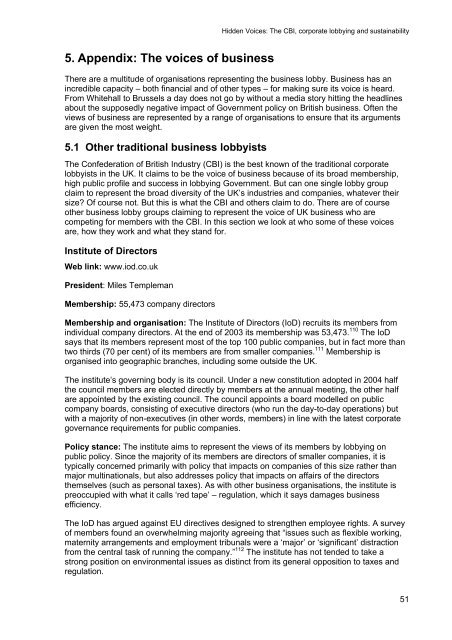hidden_voices
hidden_voices
hidden_voices
Create successful ePaper yourself
Turn your PDF publications into a flip-book with our unique Google optimized e-Paper software.
Hidden Voices: The CBI, corporate lobbying and sustainability5. Appendix: The <strong>voices</strong> of businessThere are a multitude of organisations representing the business lobby. Business has anincredible capacity – both financial and of other types – for making sure its voice is heard.From Whitehall to Brussels a day does not go by without a media story hitting the headlinesabout the supposedly negative impact of Government policy on British business. Often theviews of business are represented by a range of organisations to ensure that its argumentsare given the most weight.5.1 Other traditional business lobbyistsThe Confederation of British Industry (CBI) is the best known of the traditional corporatelobbyists in the UK. It claims to be the voice of business because of its broad membership,high public profile and success in lobbying Government. But can one single lobby groupclaim to represent the broad diversity of the UK’s industries and companies, whatever theirsize? Of course not. But this is what the CBI and others claim to do. There are of courseother business lobby groups claiming to represent the voice of UK business who arecompeting for members with the CBI. In this section we look at who some of these <strong>voices</strong>are, how they work and what they stand for.Institute of DirectorsWeb link: www.iod.co.ukPresident: Miles TemplemanMembership: 55,473 company directorsMembership and organisation: The Institute of Directors (IoD) recruits its members fromindividual company directors. At the end of 2003 its membership was 53,473. 110 The IoDsays that its members represent most of the top 100 public companies, but in fact more thantwo thirds (70 per cent) of its members are from smaller companies. 111 Membership isorganised into geographic branches, including some outside the UK.The institute’s governing body is its council. Under a new constitution adopted in 2004 halfthe council members are elected directly by members at the annual meeting, the other halfare appointed by the existing council. The council appoints a board modelled on publiccompany boards, consisting of executive directors (who run the day-to-day operations) butwith a majority of non-executives (in other words, members) in line with the latest corporategovernance requirements for public companies.Policy stance: The institute aims to represent the views of its members by lobbying onpublic policy. Since the majority of its members are directors of smaller companies, it istypically concerned primarily with policy that impacts on companies of this size rather thanmajor multinationals, but also addresses policy that impacts on affairs of the directorsthemselves (such as personal taxes). As with other business organisations, the institute ispreoccupied with what it calls ‘red tape’ – regulation, which it says damages businessefficiency.The IoD has argued against EU directives designed to strengthen employee rights. A surveyof members found an overwhelming majority agreeing that “issues such as flexible working,maternity arrangements and employment tribunals were a ‘major’ or ‘significant’ distractionfrom the central task of running the company.” 112 The institute has not tended to take astrong position on environmental issues as distinct from its general opposition to taxes andregulation.51


